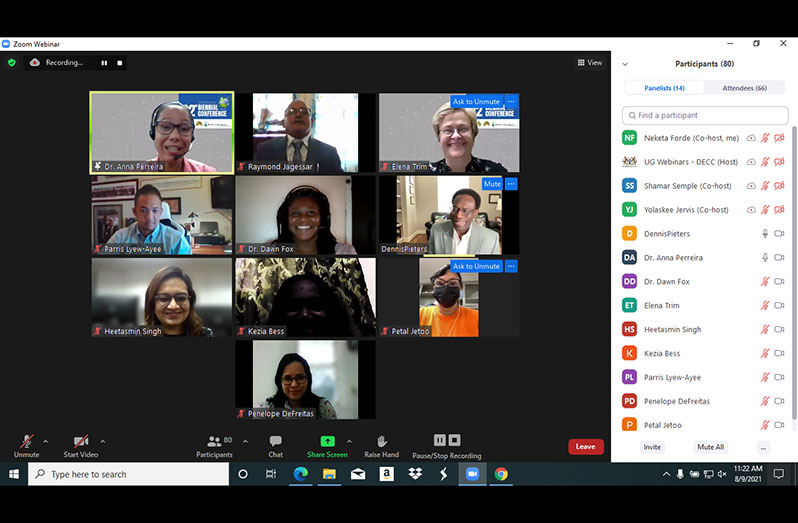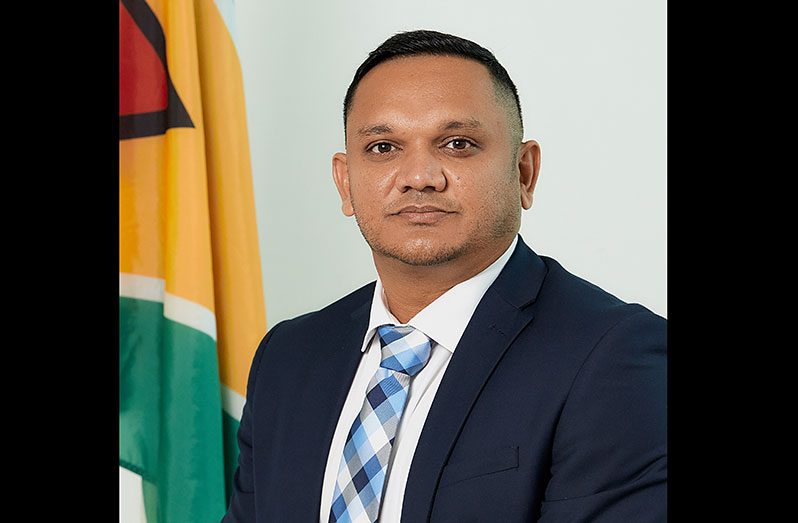THE 22nd Biennial Caribbean Academy of Sciences (CAS) Conference, being hosted virtually by the University of Guyana and CAS, was declared open on Monday with Minister of Natural Resources, Vickram Bharrat, underlining the importance of achieving the sustainable development goals, more particularly, the aspect in relation to renewable energy, which he said will catapult the development and the Caribbean at large.
The virtual conference is being hosted by UG under the theme: “Science, Technology, and Innovation for Sustainable Development in a Greener Caribbean” and will run from August 9th to 14th.
The conference aims to address pertinent issues in relation to science and technology in the region and the world and will see high-level experts making presentations on research projects they have conducted.
 Among those presenting remarks at the opening ceremony were Minister Bharrat; Professor Paloma Mohamed-Martin, Vice-Chancellor, XI, University of Guyana; Professor Raymond Jagessar, President, CAS, Central; Elena Trim, President, CAS, Guyana Chapter; Dr. Anna Perreira, Vice-President, CAS, Guyana Chapter, and Dennis A. Pieters, Director of Mid-Atlantic Oil and Gas Inc. (Guyana).
Among those presenting remarks at the opening ceremony were Minister Bharrat; Professor Paloma Mohamed-Martin, Vice-Chancellor, XI, University of Guyana; Professor Raymond Jagessar, President, CAS, Central; Elena Trim, President, CAS, Guyana Chapter; Dr. Anna Perreira, Vice-President, CAS, Guyana Chapter, and Dennis A. Pieters, Director of Mid-Atlantic Oil and Gas Inc. (Guyana).
In his feature address, Minister Bharrat sounded a call for cleaner energy to be used as Guyana does its part to tackle Climate Change.
He argued: “The use of more renewable energy is inextricably linked to us achieving our sustainable development goals. Specifically, goal number 13 speaks to reducing climate change and goal number 12 speaks to responsible consumption and production.
“With the use of technology, alternative sources of energy that are environmentally friendly have been created, such as biomass, geothermal resources, and hydropower. The use of renewable energy not only saves the environment but also helps us as a nation to achieve sustainable development. And, if every country and island in the Caribbean community uses more renewable energy, we will have a greener, cleaner and stronger Caribbean.”
MUCH MORE WORK TO
Further, Minister Bharrat posited that Guyana has much more work to be done to achieve its environmental and energy goals but the government is committed to achieving a greener country.
He urged: “We must acknowledge the challenges of achieving sustainable development in order to embrace the sacrifices we must make. Our world is dying and we must preserve the resources that we have before it is too late. Being a third-world country, Guyana and many other Caribbean countries are heavily reliant on our human and environmental resources; therefore, we must use them in a careful manner.”
Vice-Chancellor, XI, Professor Mohamed-Martin, in her opening remarks, urged that the men and women working in the field of science and technology in the Caribbean be recognised and celebrated.
According to Professor Mohamed-Martin, investment in the field of science and technology is of paramount importance for the region at large.
“We have to push for investment in science and technology, and this was articulated in the University of Guyana 2040 Blueprint which sees the need for us to retool many of our offerings especially in the way in which we teach and treat with science and technology.”
The VC further observed: “We must know what the problems are and in order to do so, we need to invest in research. And, most times, this is the first thing that gets cut from our budget.”
Notwithstanding the limited investment in science and technology, Professor Mohamed-Martin advocated for the introduction of science and technology streams from the primary to tertiary levels throughout the region. “In order for us to make science normal and natural for everyone, we must have more activities for young people and children.”
Adviser to the Minister of Science, Energy, and Technology, Jamaica, Dr. Parris Lyew-Ayee Jr. in his address posited: “Jamaica has a science technology and innovation policy from 2019 to 2029, entitled; Catalysing National Development. In order to join the developed world, Jamaica needs to leverage science, technology, and innovation to advance national development, increased global competitiveness, improve the lives of its citizenry and pave the way for excellence.”
BUSINESS APPROACH
He argued that a business approach to science will allow for greater synergies for innovation that will have an impact far beyond the primary sciences.
“We will need an enabling policy environment and a seriousness of purpose in order to achieve the proper infrastructure if we are to reflect a general Caribbean reality as it relates to our common development agenda underpinned by similar histories and regional collaboration enshrined in regional bodies such as CARICOM.
“As a region and individual countries, we need to focus on how we increase our spending on research as fast as possible as the percentage of our GDP. We need to invest in education, infrastructure, and support systems to build a sustainable ecosystem. Not one or the other, all of them,” said Dr. Lyew-Ayee.
He suggested that going forward, the region needs to ensure that “a strong policy framework exists with a supportive posture, review existing legislation and update it, if necessary, and introduce new legislation based on new information. We need the interlinkages with all government agencies with science interests… We need to have the proper investments in education, to make sure we have the infrastructure and ecosystem to prevent these billion scientists from leaving our region. We need partnerships, equity, social impact, cohesion, and communication which is something this conference is emphasizing,” Dr. Lyew-Ayee admonished.
Director of Mid-Atlantic Oil and Gas Inc. (Guyana), Dennis A. Pieters, eloquently conducted a presentation on the Coastal Georgetown, Guyana touching on topics such as exploration, production, upstream, downstream, the specifics of the oil industry, refineries and petrochemical companies, amongst other matters.
The opening ceremony was chaired by Professor Raymond Jagessar– President, Caribbean Academy of Science (CAS) Central. Elena Trim, President, Caribbean Academy of Science (CAS) Guyana Chapter introduced the main speakers, while Dr. Anna Perreira, Vice-President, Caribbean Academy of Science (CAS) Guyana Chapter, did the vote of thanks and officially declared the conference open.
The five-day conference is open to all academics, researchers, educators, industry personnel, graduate, and undergraduate students.
Several high-profile speakers are expected to make presentations in the next few days. These include Percy C. Hintzen, Professor Emeritus, University of California, Berkeley; Guyana-born, Dr. Maya Trotz, Professor of Civil and Environmental Engineering at the University of South Florida; astronomer at the University of the West Indies, Trinidad, Dr. Shirin Haque; Guyana- born and Cuba-trained Veterinary Doctor and Zoo-technician, Dr. Devon Dublin as well as food and agriculture and nature conservation specialist, Dr. Patrick Chesney, among other regional and international experts.



.jpg)








